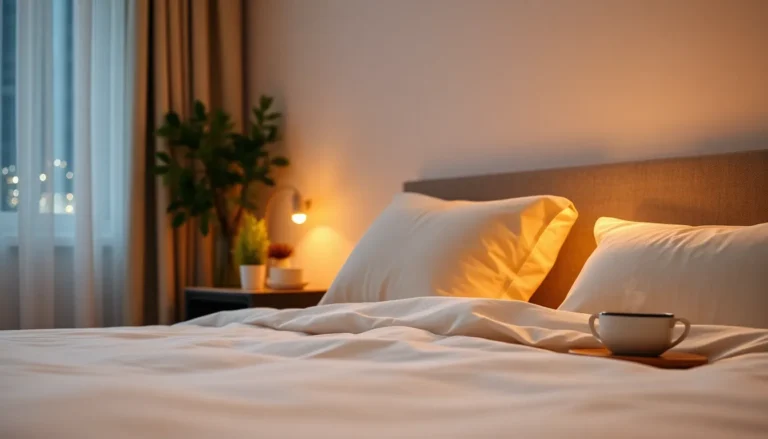When sleepless nights turn into a regular guest appearance, many wonder if Zoloft might just be the unexpected hero in their bedtime story. This popular antidepressant, known for its mood-boosting powers, has some curious side effects that could leave you snoozing like a baby. But does it really help you catch those elusive Z’s, or is it just another myth circulating in the world of sleep aids?
As people search for solutions to their sleep struggles, Zoloft often pops up in conversations. With its ability to tackle anxiety and depression, could it also serve as a secret weapon against insomnia? Let’s dive into the science and the anecdotes to uncover whether this medication can transform your restless nights into peaceful slumbers or if it’s just another pill in the sleep aid parade.
Table of Contents
ToggleUnderstanding Zoloft
Zoloft, a selective serotonin reuptake inhibitor (SSRI), treats various mental health conditions. Commonly prescribed for depression, anxiety, and obsessive-compulsive disorder, many individuals inquire about its impact on sleep quality.
What Is Zoloft?
Zoloft is the brand name for sertraline, an SSRI approved by the FDA. This medication enhances serotonin levels in the brain, promoting a balanced mood. Doctors often prescribe Zoloft to patients experiencing anxiety, panic attacks, and social anxiety disorder. Side effects may include nausea, fatigue, and changes in sleep patterns.
How Does Zoloft Work?
Zoloft operates by increasing the amount of serotonin available in the synaptic cleft between neurons. Serotonin, a neurotransmitter, significantly affects mood and emotional regulation. By inhibiting the reabsorption of serotonin, Zoloft fosters a more stable mood. Increased serotonin levels might also result in improved sleep, although responses may vary among individuals. Some people may find their sleep quality enhanced, while others might experience insomnia.
Zoloft and Sleep Issues
Zoloft may impact sleep quality positively for some individuals. It can address various sleep-related problems.
Common Sleep Problems Treated by Zoloft
Zoloft is known to help with insomnia, a prevalent sleep disorder. Anxiety-related sleep disturbances often respond well to Zoloft treatment. Depression can also lead to sleep issues, which may improve with this medication. Some users report a reduction in nightmares and night sweats, enhancing overall sleep quality. Patients experiencing anxiety prior to sleep might find relief as Zoloft alleviates anxiety symptoms.
Mechanism of Action on Sleep
Zoloft increases serotonin levels in the brain, which plays a crucial role in mood regulation. Enhanced serotonin levels can lead to improved emotional well-being, encouraging restful sleep. By stabilizing mood and reducing anxiety, Zoloft may promote a more regular sleep cycle. Users with a balanced serotonin level often notice a decrease in racing thoughts at night, aiding sleep onset. Some individuals may experience less nighttime awakenings, contributing to more restorative sleep.
Research Findings on Zoloft and Sleep
Zoloft has garnered attention for its potential impact on sleep. Research offers insights into its effectiveness and limitations regarding sleep quality.
Studies Supporting the Use of Zoloft for Sleep
Several studies suggest that Zoloft may enhance sleep quality for some individuals. Research indicates that Zoloft can help reduce anxiety, which commonly disrupts sleep patterns. A 2015 study published in the Journal of Clinical Psychiatry found that participants using Zoloft reported significant improvements in insomnia symptoms compared to those receiving a placebo. User testimonials often highlight a decrease in nighttime awakenings and reduced nightmares, aligning with findings that effective mood stabilization may contribute to more restful nights. Improved sleep scores demonstrate a connection between Zoloft usage and sleep enhancement for many individuals dealing with anxiety or depression.
Studies Indicating No Effect on Sleep
Not all research portrays Zoloft as a solution for sleep issues. Some studies show that, for certain individuals, Zoloft may lead to insomnia as a side effect. A 2018 review in Sleep Medicine Reviews found that while some patients experienced better sleep, others reported increased difficulty falling asleep or staying asleep. Variability in individual responses generates mixed outcomes regarding Zoloft’s impact on sleep. Negative side effects have been documented, including increased arousal or restlessness during treatment. It’s essential to consider these conflicting findings when evaluating Zoloft’s effectiveness as a sleep aid.
Potential Side Effects
Zoloft, or sertraline, can lead to various side effects that users should be aware of. While some may experience sleep improvements, others face challenges.
Sleep-Related Side Effects of Zoloft
Insomnia can occur in individuals taking Zoloft, disrupting their sleep patterns. Some users report difficulty falling asleep or staying asleep, negatively affecting rest. Nightmares and vivid dreams can also emerge, causing anxiety during nighttime. Research indicates varied responses, with some experiencing better sleep while others encounter heightened sleep disturbances. Monitoring these side effects is essential for those trying Zoloft, as individual reactions can differ significantly.
Other Common Side Effects
Beyond sleep issues, Zoloft can cause several common side effects. Nausea frequently appears in individuals, along with fatigue and dry mouth. Dizziness may affect balance and coordination, impacting daily activities. Users sometimes report weight gain or loss, highlighting the medication’s varying effects on appetite. Sexual dysfunction can also be a concern, affecting intimate relationships. Awareness of these side effects is crucial, allowing users to communicate effectively with their healthcare providers about their experiences.
Zoloft’s potential to improve sleep quality varies widely among individuals. While some users report significant benefits such as reduced anxiety and better sleep patterns others may experience side effects like insomnia or vivid dreams. This variability highlights the importance of personalized treatment approaches.
For those struggling with sleep issues related to anxiety or depression Zoloft might offer a viable option. However it’s essential for individuals to monitor their responses and consult healthcare providers to ensure that the benefits outweigh any adverse effects. Ultimately the journey to better sleep can be complex and may require exploring multiple solutions beyond just medication.



